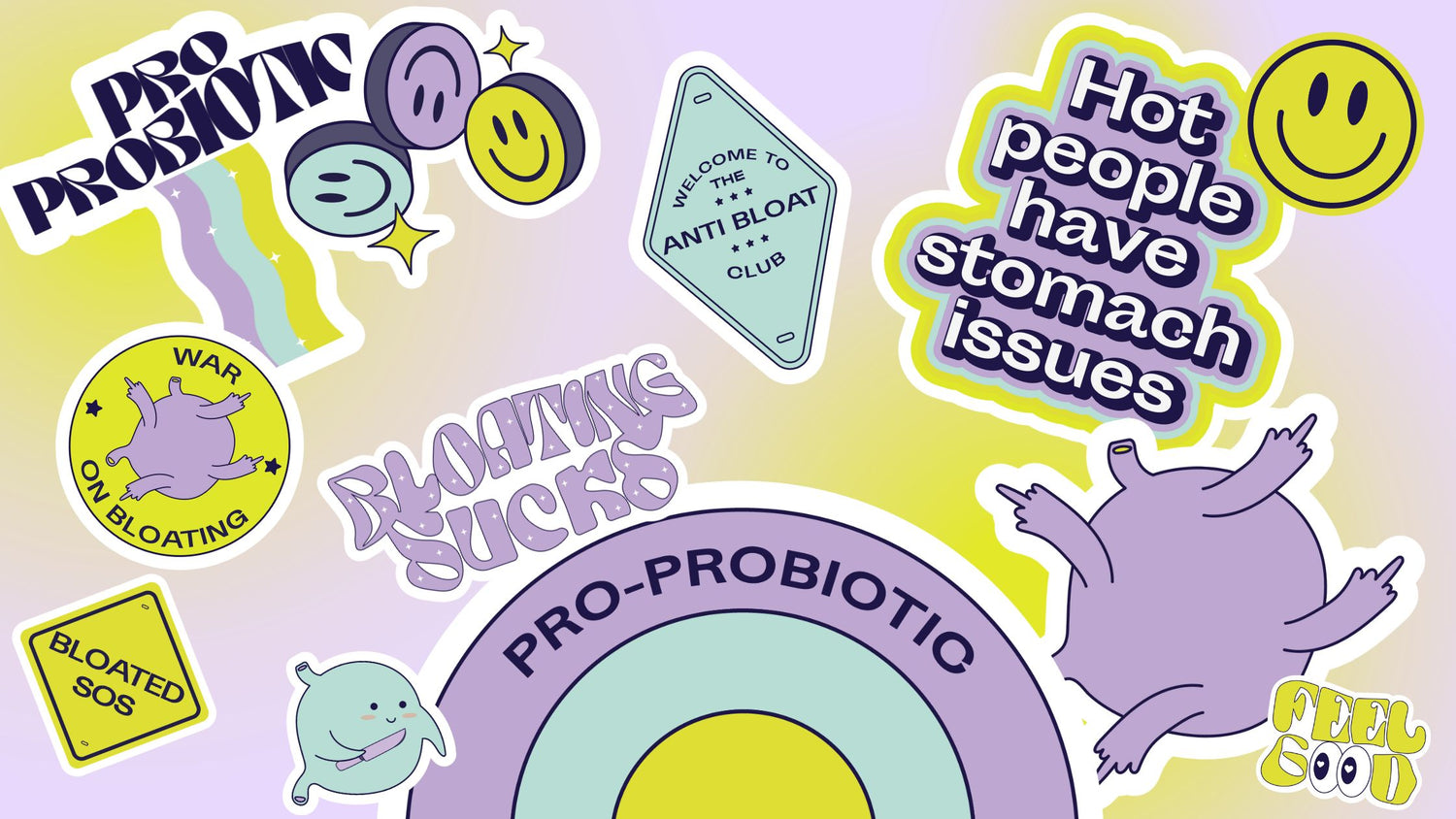Gut health has become somewhat of a ‘buzz term’ in the last few years. There are now thousands of products online that claim to ‘heal your gut’, with some being more effective than others at doing what they claim to do.
Improving your gut health is essential for your digestion and overall health. Research has shown that gut health is closely associated with physical and mental well-being. This is why you can feel lethargic, moody, and generally unwell when your gut health is poor.
In this article, we are going to discuss gut health in all its glory. More specifically, we cover what gut health is, why it’s important, and how you can improve your gut health for maximum overall health and well-being.
What is Gut Health?
Gut health is the term given to the general balance and functionality of the gastrointestinal tract. It encompasses all of the microorganisms (bacteria, virus, and fungi) that live in symbiosis inside the lower digestive tract. There are over 100 trillion microorganisms living inside the gut (ten times more microbial cells than in the entire human body!), including up to 5000 different species of bacteria, viruses, and fungi.
A person with great gut health is able to digest food, absorb the nutrients from these foods, and eliminate waste products effectively. A healthy gut also functions effectively as part of the immune system, preventing pathogens from entering the bloodstream through the intestinal wall.
Gut health is determined by multiple factors, including the composition of the gut microbiome, the health of the intestinal structures themselves, and adequate production of digestive enzymes.
Imbalances in the gut microbiome or inflammation in the intestinal wall can cause digestive issues, such as bloating, gas, constipation, diarrhoea, and abdominal cramps. It can also lead to chronic digestive health conditions, such as irritable bowel syndrome (IBS) and inflammatory bowel disease (IBD).
Why is Gut Health Important?
Gut health has always been important, but people are recognising its important more and more. Every year, an increasing number of scientific research focuses on the gut microbiome and its influence on overall health.
The health of your gut doesn’t just influence your digestive function. It impacts your physical and mental health. The gut is often called ‘the second brain’ because it is directly connected to the brain inside the skull, and there is bidirectional communication between these two areas of the body.
Here is a more detailed breakdown of why having a healthy gut is so important.
Digestive health and function
A healthy gut promotes better digestive function and enables you to metabolise ingested foods and absorb the constituent nutrients.
Having a balanced gut microbiome with plenty of beneficial probiotic bacteria in your gut further enhances your ability to digest and ferment certain foods for maximum nutrient absorption. Probiotic gut microorganisms also produce vitamins, including the B vitamins and vitamin K.
Immune function
Around 70% of your immune system lies within your gut. Therefore, maintaining a healthy gut is key to having a well-functioning immune system and being able to eliminate infectious pathogens if they enter your body.
A healthy gut microbiome helps with regulating immune cells and ensuring they function efficiently. It also lowers inflammation within the gastrointestinal tract, which can lower the risk of IBS and both forms of IBD (Crohn’s disease and ulcerative colitis).
Metabolic health
Your gut health influences your metabolism, as the composition and diversity of your gut microbiome can influence your appetite, how susceptible you are to weight gain, where you are most likely to store fat, and how your blood glucose level responds to different foods.
Nutrient absorption and production
The small and large intestines are where most nutrients are absorbed into the bloodstream for use in various physiological and biochemical reactions within the body. Gut dysbiosis (an unbalanced gut microbiome) can cause fewer nutrients to be absorbed, negatively impacting your energy and nutrient status.
Skin health
The health of your gut affects the health of your skin, which might not be so obvious at first.
Conditions like acne, eczema, and psoriasis have been linked to gut health. An unhealthy gut can lead to increased inflammation and alter the balance of the microbiome, which may exacerbate skin conditions. By supporting a healthy gut through diet and lifestyle, you can potentially improve skin health and reduce the occurrence of skin issues.
Protection against chronic diseases
A healthy gut can help lower the risk of chronic diseases, such as cardiovascular disease, obesity, and type 2 diabetes. There is even some research suggesting that a healthy and diverse gut microbiome reduces the risk of some cancers.
Mental well-being
The gut-brain axis involves the bidirectional communication between the brain and the gut. Since there is a direct connection between these two areas of the body, it’s no surprise that your gut health can impact your mental health and vice versa.
The gut regulates the production of a neurotransmitter called serotonin, which influences your mood, appetite, and sleep. A healthy gut microbiome will ensure you produce plenty of serotonin and promote better mental well-being. In turn, maintaining a healthy gut can lower the risk of mental health disorders, including chronic anxiety and clinical depression.
How Can I Improve My Gut Health?
There are lots of things you can do to improve your gut health, and we’ve got some top tips and natural remedies to try below.
Eat a wide range of different foods
A simple yet effective ways to improve your gut health is to vary your diet. The composition of your gut microbiome depends largely on the foods you eat, and consuming a narrow variety of foods can reduce the diversity of the microorganisms in your colon.
Consider adding new foods to your diet, focusing on whole grains, fruits, vegetables, and legumes. These foods will fuel the probiotic bacteria in your gut and promote better overall digestive health. These foods contain prebiotic fibres that fuel the probiotic bacteria in your gut.
Add fermented foods to your diet
Fermented foods increase the diversity of your gut microbiome, promoting better metabolic health, immune function, nutrient intake, and mental health. This is because fermented foods contain probiotic bacteria, such as Lactobacillus and Bifidobacterium, that boost the levels of these bacterial species inside your gut and enhance your overall digestive function.
Fermented foods include yoghurt, kefir, sauerkraut, tempeh, and tofu. Including them in your diet can be a simple yet highly effective way to maintain a healthy and diverse gut microbiome to improve your digestive health and function.
Take a probiotic supplement
Alongside consuming probiotic-rich foods, consider taking a probiotic supplement for optimal gut health and function. A probiotic supplement, such as A Dose For Bloating, can support your natural gut bacteria and promote a more balanced and diverse microbiome.
Just one or two capsules of A Dose For Bloating each day can quickly eliminate digestive symptoms like bloating, gas, and constipation, thanks to its two billion probiotic bacteria, seven digestive enzymes, and seven plant extracts. Eight out of ten of our customers say they experience digestive relief after just three to four weeks of taking A Dose For Bloating daily.
Consume more prebiotic fibres
Prebiotics are the fuel for probiotics. They are fibres that get fermented by the probiotic bacteria in your gut, aiding the digestive process and producing beneficial compounds like short-chain fatty acids (SCFAs).
SCFAs help maintain the integrity of the gut lining, lower inflammation in the gastrointestinal tract, regulate the pH inside the digestive tract, and promote colonic mobility (meaning they keep things moving through the colon and reduce the risk of bloating and constipation).
Prebiotic-rich foods include whole wheat products, flaxseeds, garlic, onions, asparagus, leeks, cabbages, carrots, apples, bananas, beans, and nuts. Add lots of these foods into your diet to fuel your gut bacteria and allow them to thrive.
Avoid taking antibiotics unnecessarily
Antibiotic medications are sometimes necessary if you have a bacterial infection. However, modern medicine overuses them, and this can lead to gut dysbiosis, inflammation, and damage to the gut lining.
Overuse of antibiotics can kill the probiotic bacteria in the gut, increasing the risk of digestive issues and poor overall health. Being more mindful about your use of antibiotics is crucial for maintaining a healthy gut. Wherever possible, opt for a probiotic supplement or other natural remedies for digestive issues instead of antibiotics.
Get your body moving every day
Exercise can promote a healthier and more diverse gut microbiome. It can get things moving through your lower digestive tract and reduce the risk of constipation.
The recommended amount of exercise a week for the average adult is 150 minutes of moderate-intensity exercise or 75 minutes of high-intensity activity. Walking, gardening, or gentle swimming are great forms of moderate-intensity exercise. Running, high-intensity interval training, and strength training can be great forms of higher-intensity movement.
Eat antioxidant-rich foods
Antioxidants help to neutralise damaging reactive oxidative species (ROS), which can damage the cells within the gastrointestinal tract. Consuming antioxidant-rich foods and drinks like cocoa, fruits, vegetables, and coffee can reduce ROS in your gut, lowering the risk of damage and inflammation.
Stay hydrated
Water can aid digestion and nutrient absorption. A lack of water can slow digestion and cause damage to the mucosal lining of the intestines.
Alternatively, staying hydrated by drinking enough water each day can support your digestive health and function. It can also reduce the risk of constipation and abnormal bloating by helping to soften the stool and promote regular bowel movements. Aim for around two litres of water a day or more if you’re very active or it’s a hot and humid day.









